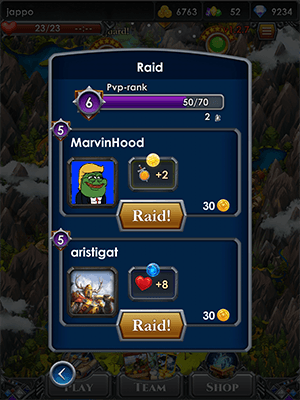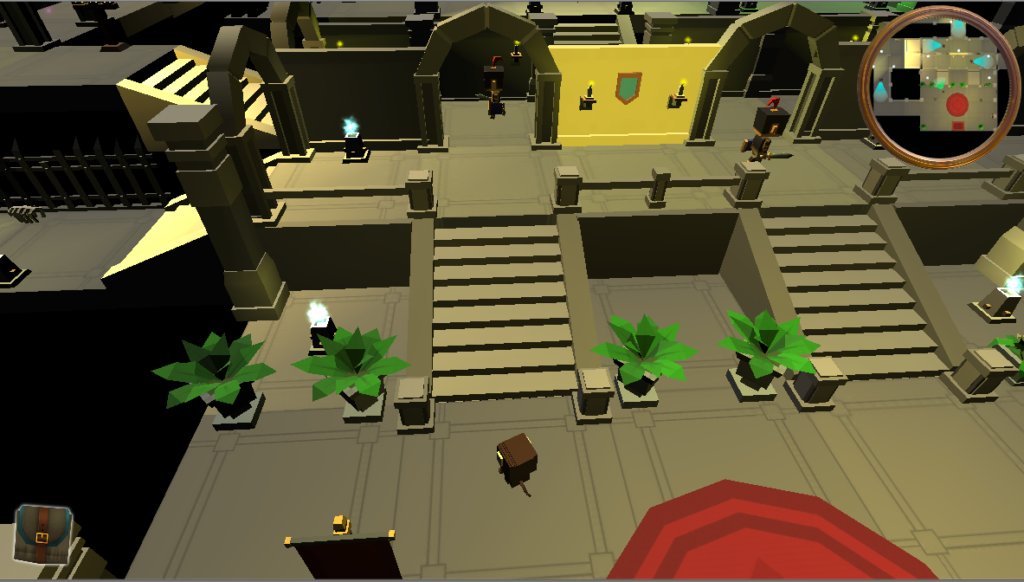
Counterparty Newsletter 04/03/2018
April’s Counterparty Newsletter includes some exciting developments and updates from projects in the community, check them out below! Ecosystem Updates
Spells of Genesis brings a few updates to players this month alongside its regular monthly campaign. Following ‘Fair February’, the month of March introduced players to ‘the Ire of March’ - available to users who have completed the first difficulty star on the Dark Creator level. Whilst the costs are the same as the previous month, March’s campaign offered new rewards to Spells of Genesis players.
As just one of the features mentioned in the new updates release, the Spells of Genesis team have updated the player experience with a footpath animation to further detail level progression, countdown animations to help better guide users through battles, alongside the ability to cancel any preemptive shots in battle. The first star of the last 5 levels has also been reduced in difficulty to allow all players better access to the monthly campaigns offered by the game’s creators.
You can also stay up to date with Spells of Genesis via their publictrello roadmap. Continuing developments include an enemy health bar, user-generated avatars on the blockchain as well as daily login bonuses for players.
Book of Orbs continues to host its beta web application to users over the past month with plans to push into its final development following the update of IndieSquare’s APIs. The final production of the web application hopes to include ledger nano support - a hardware wallet - acting as a security feature that spares users from having to enter their passphrase on the web browser. As part of the BitCrystals economy, the team managing the growth of the Book of Orbs project has been excited to have added two more environments to the Book of Orbs ecosystem.
The first, ‘Crystalscraft’ collection, acts similar to other existing environments in the Book of orbs ecosystem such as memorychain, in offering user-generated content for trading on the blockchain to its users. With an ease-of-process afforded by the more streamlined Bitcrystals platform, virtually anyone is capable of uploading and adapting their content into a blockchain asset. With themes for creators to contribute to, creations are to be sold for a limited amount of time. To learn more click here.
The second, ‘Gamicon’ collection, was exclusive to the GDC 2018 convention. Exclusively available during the time of the event, the environment acted as promotional service to the relevant parties.
The BitCrystals team also hosts weekly quizzes on Telegram where you can earn rewards such as BCY; the premium currency within Spells of Genesis.
IndieSquare is due to release a new wallet soon with a Counterparty app store built in. This feature will allow users and 3rd party developers to play and build apps to be used directly within the wallet. For instance, developer Christian Moss has shared a look at a puzzle game that conceptualizes the premise quite well.
[embed]
Sarutobi Island news remains brief this month, as Mandel Duck developer Christian Moss, works to help develop projects with IndieSquare and Book of Orbs. However, with a few more details provided surrounding the development of Sarutobi Island chapter 3, Moss details that the narrative surrounding the chapter will focus on Sarutobi needing to steal a gem from a castle with a gaming aesthetic and tactic that loans from Metal Gear Solid. A sneak peek below highlights what players have to look forward to. Mandel Duck also plans to develop lightning payment channels alongside chapter 3.
Age of Rust’s latest news provided an update from the then-ongoing beta release of the upcoming game wherein all prizes, including cross-platform blockchain cards (bar the ultimate prize of 4BTC) had been won. On March 11th the beta version of the game updated to open up another 150+ areas, and more than 80% of the game. for players to explore; as well as discover more prizes with puzzles to solve.
[embed]https://twitter.com/SpacePirate\_io/status/973688431665545216 />
Augmentors held their much-anticipated token holder alpha this month open to holders of the Databits token which allowed for the game’s initial financing - that also influenced the creation of the Databit tethers which are used as an in-game currency.
From the images below, the alpha was formed from feedback from the game’s early backer alpha wherein, in this version, players received in-game, blockchain and real-world prizes.
In other exciting news, Augmentors recently released a non-AR counterpart to its Augmented Reality premise for the convenience of its players or for the those without AR support.
[embed]
FreeWallet recently released a couple of updates. The Desktop wallet, supported across Windows, Mac and Linux now includes support for BTCpay as well as the Trezor hardware wallet.
[embed]https://twitter.com/FreeWallet\_io/status/979489173605265408 /> [embed]https://twitter.com/FreeWallet\_io/status/974378063935897600 />
FoldingCoin offers a brief update this month wherein they have hired two new java developers to help with the ever-growing progression of the project. Aside from their public meetings hosted every month (of which you can follow up here), the team recently uploaded an introductory ‘what is FoldingCoin’ animation to their social networks. You can check it out below:
<YouTube id=“2GSe4RoEGCo />
In further exciting and upcoming FoldingCoin news due to be released April 7th, Merged Folding (Beta Version 1) is due to be released. To surmise, FoldingCoin is a counterparty protocol based rewards system for contributors of Stanford’s Folding@home distributed computing system. Further details about FoldingCoin’s work with Tokenly to get Merged Folding released to its Folders will be available on this date, and the team urge those interested to attend saturday’s upcoming meeting at 14:00 UTC here.
This upcoming beta will be open for testing and use by other Counterparty projects looking to distribute tokens throughout FoldingCoin’s platform but are cautioned to remain aware of its beta status and of any potential issues as a result. You can read more about the project here and here.
In other news, FoldingCoin has also been developing merchandise with plans to make it available to the public later this year.
Counterparty in the News:
Counterparty news this month relates to the ever-growing discussion surrounding rare digital art.
The first article, “The Rise of Rare Digital Art: Blockchain Becoming Best Friend to Art World” by Joey Chiappetta, lends to this discussion with a new medium - that of ‘Silly Daddy Comics’. Chiappetta; a long time cartoonist for the comics relates his profession to the discussion, as the article notes the addition of Chiappetta’s work to the BitCrystals ecosystem as well as the longstanding heritage of comic art as a tradeable and scarce ecosystem.
A key talking point of Chiappetta’s article revolves around the theme of ownership in that the gratification and responsibility of collecting rare art culminates a unique privilege that defines digital ownership into something almost unequivocally tangible.
He adds, that there is an added value on the blockchain platform via the scarcity afforded to the concept in the tokenization protocol, that supersedes the mass exhibition present in other digital mediums, that allow for various third-party uploads. Chiappetta finishes with a note that EverdreamSoft and Book of Orbs are notable platforms for the exhibition of rare digital art with a built-in economy and 24/7 open market.
The second piece of Counterparty news this month follows suit in the form of an article from Rare Pepe Wallet founder Joe Looney. In ‘What are Rare Digital Art Goods?” Looney discusses a variety of blockchain art mediums, including Counterparty’s Rare Pepes. In questioning, “Are Rare digital goods cleverly branded alt-coins?” he answers ultimately, that no they’re not because rare art’s primary use is not currency - PepeCash excluded.
Instead, Looney declares, “rare digital goods are non-currency, transferrable, digitally native objects”.
Citing that currency is only the first application of the bitcoin [and subsequently Counterparty] protocol, Looney draws a mention to use cases such as Bitcorns for their in-game item use alongside Spells of Genesis and Rare Pepe as trading cards.
Looney goes on to highlight the ability to adapt the initial intended use of the rare goods by third parties because of their existence on the blockchain and therefore its multi-use applications. With this third-party involvement, Looney then questions - what gives rare digital art their value?
Besides obvious scarcity, he writes that rare digital art doesn’t take up physical space, has counterfeit resistance and, they hold applied characteristics such as those seen within the Rare Pepe Directory. You can read more about these features here.
In another article by DJ J-Scrilla, he introduces readers to CryptoArt and CryptoMusic and the artistic freedom afforded by rare digital art.
In his article, DJ J-Scrilla refers to CryptoMusic as a rare digital art - such as tokenized placeholders - in the music industry. For instance on platforms such as Token.FM, tokens and digital contracts - he writes - can be programmed, to benefit both artist and consumers to grant exclusive access and create exclusive and scarce merchandise.
With nods to xchain.io, he writes that this art is all transparent and scarce for the consumer to see on block explorers.
In a brief article onthemerkle.com, Counterparty protocol games; Augmentors, Rare Pepe Party, and Sarutobi Island are listed among the Top 5 Cryptocurrency upcoming games.
Sarutobi Island is also mentioned in an entertaining interview with the game’s creator Mandel Duck, about the game’s origin alongside the creator’s own history in Counterparty, and opinion on the future of Cryptogaming.
In an article onFiveThirtyEight, the theory of manufacturing scarcity continues in a conservative yet entertaining and alternative piece. In a historically and literature heavy discussion, the author warns of digital rare art’s potential demise - perhaps foregoing Rare Pepe’s less than serious ethos.
Following concerns highlighted in this piece, the Digitally Rarepublication responds to another piece by the author - agreeing that art has always been about capital countering, that therefore, in this context, the necessity has scarcity has always been implied.
In bittersweet news, theRare Pepe Foundation is no longer taking in submissions that allow the Rare Pepe directory to verify new designs. However, the Rare Pepe directory and Rare Pepe Wallet will be maintained as an homage to its history.
Counterparty Development News:
Unfortunately, due to recent events, all CIPs continue to be delayed without any ETAs. Following Indiesquare’s completion of their current wallet development, they plan to pledge some resources into adding segwit support to Counterparty. We also welcome the support of any other willing developers that would like to review the status of CIPs on GitHub and reach out to Counterparty to work on CIPs for bounties.
Going forward, development status on future CIPs are as follows:
CIP 10 and CIP 6 are subject to peer review and unfortunately, the tentative ETA of mid-February has been pushed back. There is no ETA at this time for CIP 15 (segwit) until there are more developers onboard, though it is welcome for review. You can stay up to date with current and future CIPs, as well as links to relevant GitHub pages via the Counterparty donate page.
CIP 6 - P2SH data encoding
P2SH data encoding will allow Counterparty to utilize more space for transactions. CIP 6 will be beneficial to large transactions and is a prerequisite in supporting some of the more advanced send types, such as multi-peer-multi-asset (MPMA) and Multiparty Counterparty Aggregate Transactions (MCAT).
CIP 10 - Multi-Peer Multi-Asset Sends (MPMA)
Multi-Peer Multi-Assets sends will allow many assets to be sent to many peers in a single transaction, simplifying batch transactions, and reducing transaction fees even further.
CIP 15- Segwit Support
Enabling Segwit support within Counterparty will enable users to spend less on transaction fees and enables potential future enhancements. Updating Counterwallet will allow users to choose if they want to send assets to a segwit enabled address or a traditional address.
CIPs planned for release this year:
CIP 13 - Multiparty Counterparty Aggregate Transactions (MCAT)
MCAT will allow Counterparty users to group their transactions with those of other Counterparty users, to reduce their sends costs considerably. Most users will be able to utilize this feature to send transactions for less than the cost of a single bitcoin transaction.
CIP 13 will also allow Counterparty users to utilize MCAT nodes, to send assets across the Counterparty Network, and pay for the transaction fees in an asset other than BTC.
Counterparty is an open-source, community-funded project which progresses solely through the generous time and monetary donations of others.
Again, please visit ourdonations page to stay up to date on the current bounty and development status of any CIPS, and consider making a donation to support their continued development. Alternatively, pleaseshare orRT Counterparty CIPs on social media so we can help fulfill them faster!
Counterparty hangouts are currently withheld until CIPs are next implemented, however, you can find our previous hangouts Counterparty.io shortly thereafter.
We have also recently opened up a press channel for any media inquiries and would ask any media outlets to contact press@Counterparty.io.
Please join the@Counterparty_XCP group on Telegram for breaking news and real-time Counterparty conversation!
Disclaimer: This newsletter is sent as an informational piece, and no part of it should be taken as financial advice.



